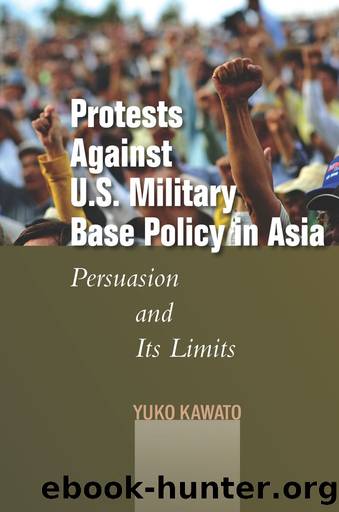Protests Against U.S. Military Base Policy in Asia: Persuasion and Its Limits by Yuko Kawato

Author:Yuko Kawato [Kawato, Yuko]
Language: eng
Format: epub
Tags: Political Science, Security (National & International)
ISBN: 9780804795388
Google: bnbeBgAAQBAJ
Goodreads: 35191920
Publisher: Stanford University Press
Published: 2015-04-08T00:00:00+00:00
4
Response to Protests in the Philippines, 1964â1965 and 1972â1979
The American military presence in the Philippines started with the Spanish-American War of 1898 and the American colonization of the Philippines. After the Philippines became independent in 1946, the two countries concluded a Military Bases Agreement (MBA) the following year, which allowed the United States to maintain its military presence. In the 1960s and 1970s, the MBA became the focal point of popular protests.
Philippine nationalism, which developed under Spanish, American, and Japanese colonialism, shaped protestersâ arguments against the MBA.1 Protesters stressed that the MBA served American interests rather than Philippine interests, allowing the United States to dominate and exploit the Philippines. In 1964â1965, protesters demanded that President Diosdado Macapagal negotiate a change in the MBA with the United States. Protesters argued that the MBA, which limited the Philippinesâ right to exercise criminal jurisdiction, had to be amended to protect Philippine sovereignty. Then, in the late 1960s and the 1970s, protesters called for a termination of the MBA and a closure of military bases to end what they considered American neo-colonialism. They referred to human rights and democratic norms. They argued that military bases should be closed because the United States supported President Ferdinand Marcos, a dictator who violated human rights, in order to maintain access to military bases. Furthermore, protesters demanded that bases be closed by arguing that they attracted nuclear attacks from enemies of the United States, who may not necessarily be enemies of the Philippines.
In both cases, protestersâ arguments against the MBA did not persuade the Philippine president or his cabinet members who negotiated base policy with the United States. Philippine policy-makers believed that the American military presence served the Philippinesâ security, political, and economic interests. This belief contributed to the rejection of protestersâ arguments that stressed the importance of sovereignty in both cases, as well as the antinuclear argument in 1979. In 1979, human rights and democratic arguments persuaded neither the Philippine dictator who violated them nor American policy-makers who chose military bases over those values. In addition, persuasion is more likely when arguments come from credible sources that are considered trustworthy and knowledgeable, but in both cases arguments against the MBA came from the Philippine presidentsâ political opposition. The presidents did not consider protesters credible.
Yet Philippine presidents had to respond to domestic criticisms of the MBA, especially when public opinion strongly demanded MBA revision and generated relevant political incentives. The United States wished to prevent a growth of anti-American nationalism in the Philippines. In 1965 Macapagal faced reelection, and protests that occurred in this political context generated important incentives for a limited policy change. In the second case, protests that occurred under martial law did not create significant political incentives for policy change. Manila and Washington decided against changing base policy but they offered symbolic concessions to protesters in order to cultivate a nationalist image for Marcos.
Responding to Protests Before a General Election, 1964â1965
In late 1964, two incidents in which American military personnel killed Filipinos triggered large demonstrations and led to an MBA amendment on criminal jurisdiction.
Download
This site does not store any files on its server. We only index and link to content provided by other sites. Please contact the content providers to delete copyright contents if any and email us, we'll remove relevant links or contents immediately.
The Radium Girls by Kate Moore(12018)
100 Deadly Skills by Clint Emerson(4921)
Rise and Kill First by Ronen Bergman(4779)
The Templars by Dan Jones(4682)
The Doomsday Machine by Daniel Ellsberg(4484)
The Rape of Nanking by Iris Chang(4203)
Killing England by Bill O'Reilly(3995)
Stalin by Stephen Kotkin(3957)
Hitler in Los Angeles by Steven J. Ross(3942)
12 Strong by Doug Stanton(3541)
Hitler's Monsters by Eric Kurlander(3328)
Blood and Sand by Alex Von Tunzelmann(3195)
The Code Book by Simon Singh(3178)
Darkest Hour by Anthony McCarten(3119)
The Art of War Visualized by Jessica Hagy(3000)
Hitler's Flying Saucers: A Guide to German Flying Discs of the Second World War by Stevens Henry(2750)
Babylon's Ark by Lawrence Anthony(2672)
The Second World Wars by Victor Davis Hanson(2521)
Tobruk by Peter Fitzsimons(2508)
